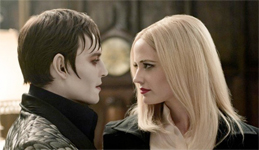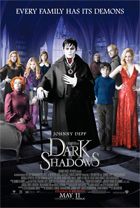Dark Shadows
|  Tim Burton and Johnny Depp are a director/actor kindred soul couple if ever there were one, having now collaborated on eight movies of varying degrees of weirdness, so it should come as little surprise that they are both fans of Dark Shadows, Dan Curtis’s long-cancelled Gothic sudser that ran during the afternoons on ABC from 1966 to 1971. An innovative and groundbreaking soap opera that nonetheless frequently fell afoul of unintended camp hilarity due to its low budget and often absurd plot developments, Dark Shadows is exactly the kind of programming you would imagine Burton and Depp devouring as kids, soaking up the gloriously deranged mix of melodramatic plotting and horror movie conventions. Tim Burton and Johnny Depp are a director/actor kindred soul couple if ever there were one, having now collaborated on eight movies of varying degrees of weirdness, so it should come as little surprise that they are both fans of Dark Shadows, Dan Curtis’s long-cancelled Gothic sudser that ran during the afternoons on ABC from 1966 to 1971. An innovative and groundbreaking soap opera that nonetheless frequently fell afoul of unintended camp hilarity due to its low budget and often absurd plot developments, Dark Shadows is exactly the kind of programming you would imagine Burton and Depp devouring as kids, soaking up the gloriously deranged mix of melodramatic plotting and horror movie conventions.It should also come as little surprise, then, that they have now collaborated on a big-screen, big-budget movie version of Dark Shadows, which is ironically only one of many attempts to reincarnate the series after its untimely demise at the hands of number-crunching network executives who felt that the program’s youth demographic didn’t deliver the goods in terms of advertising revenue. Curtis himself directed two moderately budgeted and critically scorned films in the early 1970s, House of Dark Shadows (1970) and Night of Dark Shadows (1971), and there were also two previous attempts to resurrect it as a television series, once in 1991 on NBC, where it was regularly pre-empted by the Gulf War and was cancelled after only 12 episodes, and once again in 2004, where it didn’t make it past the pilot stage. One would think that the series’ rather miserable history (might one go so far as to say it’s cursed?) would cause a major studio to think twice about trying to bring it back to life, but given that Burton and Depp’s collaborations have delivered the box-office goods in recent years (their last film together, 2010’s Alice in Wonderland, brought Disney more than $1 billion worldwide), apparently it was just too tempting for Warner Bros. to turn down. And so now we have another variation on Dark Shadows, this one vacillating uncomfortably between intentional camp comedy, loving homage to the original series’ melodramatic seriousness, and the kind of grand visual scope that is the hallmark of the digital era (the very fact that it is being projected in IMAX shows just how far removed the film is from the television series, which was originally broadcast in black-and-white video). Those familiar with the series will recognize all of the major characters, starting with fan favorite Barnabas Collins (Johnny Depp), an 18th-century aristocrat who was cursed with eternal life as a vampire by Angelique Bouchard (Eva Green), a voluptuous witch whose advances Barnabas made the mistake of spurning. Barnabas was heir to his family’s estate and fishery empire in Maine, and he carries with him his father’s admonition that family is the only true wealth. Thus, when he is dug out of the ground in 1972 after a 196-year imprisonment by Angelique, he heads straight to Collinwood, the enormous, 200-room manor his father constructed in the town of Collinsport, which the family founded. He finds the manor, and the family, in a state of ruin, having been driven into economic despair by Angelique, who founded a rival fishing company and has presided over her own growing empire for the past two centuries. The once glorious Collins family has been reduced to a shambles, headed by Elizabeth Collins Stoddard (Michelle Pfeiffer), a stern matriarch who nevertheless fails to hold the family together. Her brother, Roger (Jonny Lee Miller), is a sleazy, deadbeat dad whose young son David (Gulliver McGrath) is in constant therapy with a boozy live-in psychiatrist (Helena Bonham Carter) because he insists that he sees his dead mother. Elizabeth’s 15-year-old daughter, Carolyn (Chloë Grace Moretz), is a surly rebel whose facial expressions shift largely between general disgust and a more lacerating teenage sneer. Barnabas makes it his goal to bring the Collins family back to its former glory by renovating Collinwood and rebuilding the family business, all of which is done in a montage set to The Carpenters’ “Top of the World.” Otherwise, the film’s second half has little to do except draw out the extended feud between Barnabas and Angelique, who is intent on possessing him no matter what, and trying to develop some kind of romance between Barnabas and Vicky Winters (Bella Heathcote), the family’s new governess who was strangely drawn to Collinwood and bears a striking resemblance to Josette DuPres, Barnabas’s fiancée who was lulled into suicide by Angelique 200 years earlier. While you can sense what Burton and screenwriter Seth Grahame-Smit (best known as the historical-horror mash-up novelist behind Pride and Prejudice and Zombies and Abraham Lincoln, Vampire Hunter) are trying to do with Dark Shadows, it never quite clicks. There is quite a bit of fun to be had in the recreation of the Nixon era, with its Vietnam-protesting hippies, shag carpet, lava lamps, Macramé, ultra-wide lapels, and Day-Glo colors (even the film’s blood looks like it was designed to be viewed under a blacklight), and we can only imagine how much fun Burton and company had deciding which early ’70s tunes to pair with which scenes (a little Moody Blues’ “Nights in White Satin” here, some Black Sabbath there). They even dig up Alice Cooper (digitally youthenized, of course) to perform a few songs at a “happening” Barnabas throws for the town. Yet, nostalgic music and digs at the bad aesthetic choices of a previous era, no matter how well executed, will only get you so far, and at some point we have to be invested in Barnabas’s many plights, and we never are. Johnny Depp gives it his all in recreating the character first played by Jonathan Frid (who has a brief cameo in the film, but sadly passed away a few months ago), and he imbues Barnabas with an amusingly arch sense of decorum that runs afoul of both the social crudities of the modern era and his own need to drink human blood. With his Nosferatu fingers and Frankenstein-needs-a-trim haircut, he is both a monster and a hero, but mostly just an extended fish-out-of-water gag. His darkened eye sockets and waxy white skin might evoke memories of the first Depp-Burton collaboration, Edward Scissorhands (1990), but while that bittersweet film generated both laughs and real sentiment with its quirky view of Gothic tropes and suburban malaise, Dark Shadows strains for both and never quite achieves either. Copyright ©2012 James Kendrick Thoughts? E-mail James Kendrick All images copyright © Warner Bros. |
Overall Rating: 
 (2)
(2)


